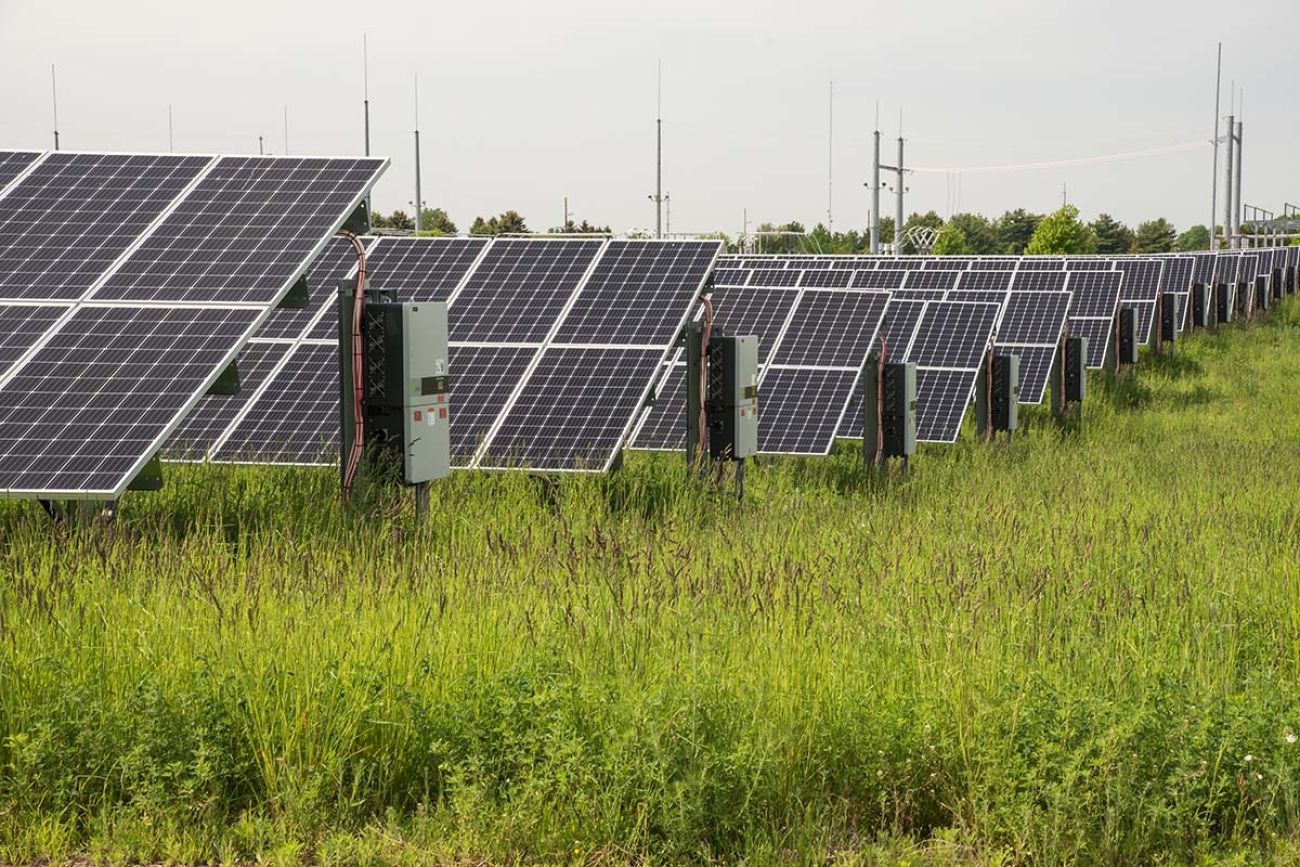Michigan Democrats: Utilities must use 100% carbon free energy by 2035

- Michigan Senate Democrats have unveiled sweeping energy reforms designed to wean Michigan off fossil fuels
- They want Michigan to adopt a standard requiring utilities to get 100 percent of their power from carbon-free by 2035
- Michigan’s biggest utilities are currently aiming for net zero carbon emissions by midcentury
Michigan Senate Democrats on Wednesday announced a sweeping bill package that aims to put legal teeth behind efforts to wean Michigan off fossil fuels.
The package, which Democratic leaders said would be filed by Thursday, would require state-regulated utilities to stop burning coal by 2030, and would require them to deliver 100 percent clean energy by 2035.
Senate Democrats spokesperson Rosie Jones initially said Wednesday that would be a renewable energy requirement but later clarified the bill would require “carbon-free” energy. She did not specify whether that leaves the door open to utilities continuing to use fossil fuels while deploying carbon capture technology or other means of offsetting emissions.
The bill package would also require utilities to prioritize energy efficiency by strengthening the state’s so-called energy waste reduction standard and applying it to more utilities.
Related:
- Democratic control of Michigan puts climate change action on 2023 agenda
- Michigan climate plan calls for EV incentives, faster renewable transition
Senate Majority Floor Leader Sam Singh, D-East Lansing, hailed the pending package as long overdue and said legislative Democrats “really wanted to focus on climate” as they enter their second quarter in power.
Singh said the package amounts to the largest rewrite of Michigan energy law since the sweeping 2016 reforms that, among other things, required utilities to get 15 percent of their energy from renewables by 2021.
“It allows protection of our residents, it protects our (electricity) rates, and then it allows for us to be able to tackle a very difficult issue of climate,” Singh said.
He added that “it's time for us to be moving beyond just goals,” instead setting new, enforceable green energy targets that utilities must meet.
Jeff Wiggins, press secretary for Senate Minority Leader Aric Nesbitt, R-Lawton, decried the bills as “another energy plan from the ‘lost decade,’ the first decade of the 2000s when Michigan struggled against slow economic growth and low employment rates.
“Any plan that pushes for more government mandates, extreme environmentalist policies, and moves away from an ‘all of the above’ energy portfolio will surely make our electric grid less reliable and rates skyrocket,” Wiggins said. “This is the last thing Michigan families need with high inflation.”
The package follows a vow by Gov. Gretchen Whitmer to make Michigan carbon-neutral by 2050. Whitmer released a climate plan last year spelling out how she expects the state to get there.
The 2035 carbon-free energy standard proposed by Democrats is far more ambitious than the goal established in Whitmer’s own climate plan. Whitmer had called for a standard requiring 50 percent renewables by 2030 and did not set a target for a 100 percent renewable standard.
According to information provided by Senate Democrats, other aims of the package include:
- Allow the Michigan Public Service Commission, which regulates investor-owned utilities, to evaluate climate, health, equity and affordability when it reviews and approves utilities’ long-term energy plans. That process currently focuses primarily on ensuring reliable electricity at fair rates, with less room for commissioners to consider environmental issues and other concerns.
- Allow farmers to rent their land for solar arrays while still enrolling in the state’s farmland preservation program
- Adopt a clean fuels standard requiring a 25 percent reduction in carbon emissions from transportation fuels by the end of 2035
- Develop a plan to reduce emissions related to heating buildings by 17 percent by 2030
Michigan’s biggest utilities, Consumers Energy and DTE Energy, have both expressed hesitation about new renewable energy mandates.
In a December interview with Bridge, DTE Vice President of Corporate and Government Affairs Andy Coulouris, said utilities are already running at “an all out sprint” to get off fossil fuels. Both DTE and Consumers utilities have plans to go carbon neutral by midcentury.
“That’s happening not because of any mandates,” Coulouris said. “It’s happening because the technology supports it, the economics support it and, increasingly, our customers and our stakeholders expect it.”
Brandon Hofmeister, senior vice president of governmental, regulatory and public affairs at Consumers Energy, said in December that the utility is on-track to get a little more than 40 percent of its electricity from renewables by 2030.
Speaking about the bill package Wednesday, Sen. Sue Shink, D-Northfield Township, referenced days-long power outages in the wake of recent ice storms as evidence of the need for greater utility oversight.
In the wake of those outages, “we heard a lot from residents around accountability,” said Shink, who is sponsoring the bill that would boost the MPSC’s ability to regulate utilities.
Additional legislation will address electric vehicles, she said, dealing with expanding charging stations and incentives for EVs.
The Biden administration on Tuesday unveiled its own proposals to cut auto sector emissions by more tightly regulating tailpipe exhaust and requiring electric vehicles to account for as much as two-thirds of cars sold in the U.S. by 2032.
The state Democrats’ announcement comes as the state hosts a two-day conference focused on achieving the goals of Whitmer’s climate plan. Whitmer gave a keynote speech Tuesday, and Wednesday’s agenda includes discussions about specific steps needed to cut emissions, from reducing food waste and weatherizing homes to expanding electric vehicle charging infrastructure.
The items included in the Democratic plan largely mirror the priorities of climate activists, who held a press conference Tuesday urging legislators to adopt laws that will wean Michigan off fossil fuels.
“We cannot continue a course of incremental progress and half-measures here in Michigan,” said Rafael Mojica, program director of Soulardarity, a nonprofit utility watchdog that promotes affordable energy rates and clean energy deployment.
Mojica called the climate plan a first step but said “we can go further and faster,” adding that “we look forward to our legislature to listen to people who no longer accept the status quo.”
Mike Alaimo, environmental and energy affairs director of the Michigan Chamber of Commerce, said industry groups have not yet seen the text of the bills. But in general, Alaimo said, his group believes the push for clean energy needs to be balanced against reliability and affordability concerns.
“We need policies that reflect all of those priorities equally,” Alaimo said, and deploying clean energy too fast could lead to compromise on cost and service.
Alaimo also said he wants to see lawmakers balance mandates with incentives to help businesses that are willing to adopt environmentally-friendly practices, but face multi-million-dollar tabs to trade smokestacks for emissions-free operations.
“The environmental benefits are enormous, but it comes at a cost,” Alaimo said. “That's just the reality.”
Activists also called on lawmakers to use the state budgeting process to funnel money toward home weatherization and other efforts that would help drive down emissions and save Michigan residents money on their energy bills.
“The state budget is a list of priorities,” said Roslyn Ogburn, partnerships coordinator for the Michigan League of Conservation Voters. “But we’re asking to put climate at the top of that priority.”
Shink said Democratic lawmakers plan to do so, prioritizing both state dollars and the surge of federal infrastructure money the Biden administration has put on the table.
“There's a lot of money in the infrastructure bill that we can pull down for climate related issues,” she said. “We want to make sure we bring as much of that federal money back to Michigan, into our local communities.”
Michigan Environment Watch
Michigan Environment Watch examines how public policy, industry, and other factors interact with the state’s trove of natural resources.
- See full coverage
- Subscribe
- Share tips and questions with Bridge environment reporter Kelly House
Michigan Environment Watch is made possible by generous financial support from:
Our generous Environment Watch underwriters encourage Bridge Michigan readers to also support civic journalism by becoming Bridge members. Please consider joining today.
See what new members are saying about why they donated to Bridge Michigan:
- “In order for this information to be accurate and unbiased it must be underwritten by its readers, not by special interests.” - Larry S.
- “Not many other media sources report on the topics Bridge does.” - Susan B.
- “Your journalism is outstanding and rare these days.” - Mark S.
If you want to ensure the future of nonpartisan, nonprofit Michigan journalism, please become a member today. You, too, will be asked why you donated and maybe we'll feature your quote next time!






